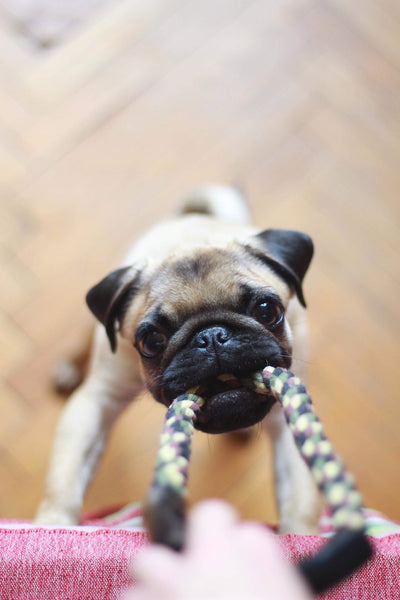If your dog is an avid chewer, he’s not alone. After all, bones and dogs make a stereotypical pair—though this stereotype may be a bit outdated.
There was a time when dog owners would toss their pooch a raw bone during dinner prep, without much thought. However, as time goes on and we learn more about dog dental health, nutrition, and safety, it’s important to be well-educated and cautious about anything our furry friends may be putting in their mouths.
Why Do Dogs Chew?
Like digging and tail wagging, chewing is common canine behavior, and it certainly isn’t random.
There are several reasons why dogs chew, including:
-
Stress relief. Some pups use chewing as a way to soothe themselves when they’re feeling stressed, frustrated, or anxious. If your dog is prone to destructive chewing around the house when you’re gone, he may be struggling with separation anxiety.
-
Entertainment. Some dogs chew simply because it’s a fun “project” to work on, especially if they’re full of excess energy. If your pooch isn’t getting enough physical and mental stimulation and doesn’t have access to appropriate chew toys, he may begin chewing on your household items instead.
- Dental health. Chewing naturally scrapes plaque off of the teeth, making it a convenient addition to your dog’s dental health routine. (However, this doesn’t mean you should skip out on canine teeth brushing and routine dental check-ups!)
Because chewing is safe, normal, healthy dog behavior, you shouldn’t try to stop your dog from chewing altogether. Instead, you’ll want to make sure your house is stocked up with plenty of chew toys for your pet so he doesn’t go after your furniture and shoes instead!
Are Bones Safe for Dogs?
In addition to acting as a chew toy, bones can boost your dog’s dental health. Raw meat enzymes can kill off bacteria, and bones can be a good source of minerals and nutrients.
Those who feed their dogs a raw diet may be familiar with the benefits of whole or ground raw bones, and may give their dogs raw muscle meat still on the bone.
However, when it comes to bones and dogs, caution is crucial. Make sure the bone is large enough that it cannot be swallowed whole. Never give your dog a cooked bone; it could crack and splinter, causing choking or internal damage. Even when raw, poultry or pork bones can also provide the same hazards as cooked bones.

Alternative Chew Toys
For those whose picky dogs don’t like bones, or who prefer to avoid the risks associated with bones, it may be a good idea to consider some dog chew toy alternatives.
Rawhide is one option, although it’s not always the safest option. While its cost, availability, and flavors can be appealing, it’s important to do your research to ensure you’re choosing a high-quality rawhide chew for your dog.
As far as other commercial options go, consider all-natural products such as bully sticks or even antlers.
If you have a Kong or other hollow chew toy, you could try stuffing it with ice chips, frozen dog-friendly broth, peanut butter, or other yummy canine treats.
Raw or frozen full-size carrots can be a healthy, chewable treat for your pup. Plus, they’re rich in nutrients and low in calories.
Of course, we can’t forget about PetHonesty’s Oral Hygiene Fresh Sticks. Their plaque-scraping grooves and ridges combined with natural ingredients such as green tea extract, peppermint oil, and enzymes will support your dog’s dental health and keep his breath smelling fresh.
Signs of Dental Issues in Dogs
In addition to providing plenty of chew toys, don’t forget about keeping your dog’s pearly whites extra clean by brushing or even wiping his teeth on a regular basis.
If your dog is reluctant to chew on his food or toys (and isn’t usually picky), he may be experiencing pain in or around the mouth. Behavioral changes, such as irritability, could also be a sign of pain.
Along with reluctance to chew, keep an eye out for any abnormal chewing such as favoring one side of the mouth over the other. Excessive drooling or dropping food from the mouth could also be a sign of dental health issues.
It doesn’t hurt to do an occasional home health check by examining your pup’s mouth for any discolored, broken, loose, or missing teeth. Check for any swelling or discoloration in and around the gums, along with any changes in gum color—they should typically be a light pink color, although some dogs naturally have dark or patchy-colored gums.
Promote your dog’s overall health with PetHonesty’s 10-for-1 Multivitamin. These soft chews provide a healthy dose of vitamins, minerals, omegas, and probiotics to keep your furry friend feeling happy and healthy.
Sources:
https://www.eastmeadowvetclinic.com/best-rawhide-alternatives/
https://www.caninejournal.com/rawhide-alternative/
https://www.portroyalveterinaryhospital.com/safe-dog-bones-and-chews
https://www.akc.org/expert-advice/health/give-a-dog-a-bone-be-careful/













